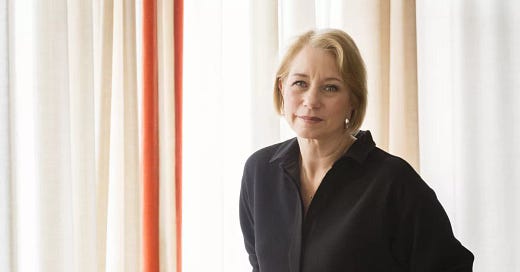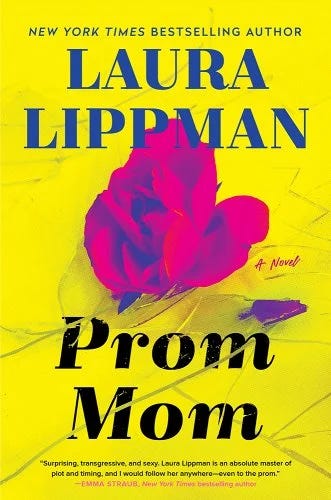Interrogation(s): Laura Lippman
A decade of chats with the author of the new Prom Mom
I’ve probably interviewed Laura in different capacities more than any other writer. With her new book, Prom Mom, publishing today (7/25/23), I’m reviving three of our previous Q&As, spanning a dozen years.
You can find Laura’s newsletter here:
From 2021…
(from Blood & Whiskey #3)
Jean Hanff Korelitz’sThe Plot pokes at the same testy question driving Laura Lippman’s excellent new Dream Girl: who has the right to tell another person’s story? I’ve read most of Lippman’s books, going back to the start of her Tess Monaghan reporter-turned-PI series (Baltimore Blues, etc.), and it was fun to see Tess make a sassy cameo in Dream Girl. In a hat-tip of sorts to Stephen King’s Misery, Lippman’s latest gives us a cranky, thrice-divorced novelist, Gerry Anderson, bedridden and Oxy’d up in his Baltimore penthouse after an accidental fall, where he’s being taunted by a woman claiming to be the real “Aubrey” character featured in his mega-bestselling novel, Dream Girl.
Like The Plot, there are nods to the weird world of writing and publishing: agents and award dinners and MFAs. In both books, the authors insist they “made it all up” and that the root source of their story (and, in turn, their wealth) doesn’t matter. In both stories — both featuring men writing about women, seemingly with nuance and complexity that exceed their writing chops (and empathy) — the source begs to differ.
Lippman is very funny, and often cranky. Anderson gives his agent “15 percent of a smile.” Of an assistant whose sentences all sound like questions, he wonders: “Is it so wrong that he wants to hold her head under water every time she ends a sentence on a rising note?” Ultimately, the biggest question for the protagonist is existential: “Do you know anyone, Gerry? Even yourself?” Dream Girl is pure psychological page turner.
I worked with Laura decades ago at the Baltimore Sun and interviewed her in my past life at Amazon — and scroll down for a pic of my 2018 onstage interview with Laura and her husband, David Simon, for Seattle Arts & Lectures.
To keep the interview streak alive, I reached out for this mini Q&A:
Risk?
I've never done an entire book from a man's POV and Gerry is such a prickly, unlikable man.
Fuel?
Toward the end of the writing process, we were in lockdown — well, technically, under a stay-at-home advisory — and my daughter was in virtual school. I had to start getting up super early to write. And it was fantastic.
Favorite line?
"You're a writer, make something up." One of Gerry's not terribly helpful helpers.
From 2012…
Ten years ago I left my last newspaper job, capping off a five-year gig at the once-great Baltimore Sun. Among the many inspiring reporters and editors I worked with was Laura Lippman, and it's been great to watch Laura's writing career evolve from her early Tess Monaghan novels to the fantastic stand-alone novels of recent years. Laura's latest is And When She Was Good. During her Seattle book tour stop last week, we caught up and talked books over a midday beer.
Describe your book in 10 words?
She's the mom next door -- and a high-priced call girl.
What's on your nightstand/bedside table/Kindle?
Pages away from finishing galley of Ben Schrank's Love is a Canoe. Reading John Lanchester's Capital on my iPad. Gearing up for annual Marjorie Morningstar re-read, which makes my husband fear for my mental health.
Favorite books of all time?
Lolita, Emma Who Saved My Life, Love Story (not the one you think but a memoir by Ruth McKenney, who wrote "My Sister Eileen," among other things), the entire Betsy-Tacy series.
Important book you never read?
Ulysses.
Book that made you want to become a writer?
A Tree Grows in Brooklyn is under-rated, in my opinion. Made me want to be a writer and also taught me some valuable lessons about writing.
Most memorable author moment?
I started as a paperback original writer and one of the first things I ever did to promote my work was have a pizza party with the drivers who put the books in racks at grocery stores, drug stores, etc. One of them asked me if this was my first novel and I swelled with pride when I said yes, figuring he was going to comment on my youth. Instead, he shook his head and said: "And you're already $5.99?"
What talent or superpower would you like to have (not including flight or invisibility)?
I want to be able to inhabit other people's minds, to feel what they are feeling--but I want to be able to shut it off, too.
What are you obsessed with now?
Finding a bed for our narrow rowhouse that will allow us to have a place to put books and beverages.
What are you stressed about now?
Being away from my 2-year-old daughter for the longest period since she was born.
What are you psyched about now?
People are reading! I am actually super Pollyanna-ish about the future of the book in all formats. I think reading is increasingly appealing in our chaotic world.
What's your most prized/treasured possession?
Right now, the single most important thing in my household is a stuffed Winnie the Pooh who is so dirty he appears to have leprosy. My life's not worth living if he disappears.
Pen Envy - Book you wish you'd written?
That changes day to day, so in this day, this moment, I'll say Stewart O'Nan's Emily Alone.
What's next for you?
A novel inspired by the disappearance of Julius Salsbury, who skipped out on a 15-year sentence connected to his numbers/sports book empire and was never seen again. But I'm interested in writing a novel about the women left behind--a wife, three daughters and a mistress.
Favorite line?
From Auden: For poetry makes nothing happen: it survives/In the valley of its making where executives would never want to tamper, flows on south/From ranches of isolation and the busy griefs/Raw towns that we believe and die it; it survives,/A way of happening, a mouth.
Favorite method of procrastination? Temptation? Vice?
Cleaning is for procrastination. Procrastination is temptation. If wine is a vice, so be it.
What do you collect?
Folk art.
Best piece of fan mail you ever got?
Technically not fan mail, but Stephen Sondheim did write me when he heard that he was referenced in To the Power of Three, so I sent him a copy and appreciated the fact that he entrusted me with his return address. In exchange, I have resisted the urge to stalk him.
From 2011…
I got to know Laura years ago when we worked together as reporters at the Baltimore Sun, and I've since followed her relentless progress as an author - eleven novels in her award-winning Tess Monaghan reporter-turned-investigator series and, my favorites, five moody, spooky stand-alone novels.
Her newest stand-alone, The Most Dangerous Thing, is the most personal of her thirteen books, as she explains in the acknowledgements. I asked Laura if she'd describe a scene or passage that was particularly memorable or emotional or difficult to write, and to explain how she wrote it and how it felt.
Here's her response...
"My first novel was published in 1997 and I’ve always been very open about the fact that I didn’t really know what I was doing. Few first novelists do, no matter how polished their efforts. But I had some insights into the road ahead of me and I knew that I would get only one shot to write about the neighborhood where I grew up in Baltimore and that I should wait until I was ready. Ready in terms of skill, but also in terms of story. Not just any novel could be shoehorned into this setting.
"Dickeyville (unfortunate name) is an old mill village tucked away in a corner of Northwest Baltimore. Most of the houses date to the 19th century. A stream meanders through it and a vast, overgrown forest, Leakin Park, curves around one edge. As a child in the ‘70s, I wandered those woods with impunity, disappearing as children did in that era, with few warnings and even fewer rules. It was a perfect setting for the story I decided to tell in The Most Dangerous Thing, which centers on a group of childhood friends burdened with a terrible secret.
"But if one is going to write about Dickeyville, one must write about its 4th of July parade, an event that epitomizes everything that is charming and quaint and, okay, maybe a little smug and self-satisfied about the neighborhood. I struggled with that chapter for a long time. It centered on a boy who has been sexually abused and his decision to march in an inappropriate costume -- and his father’s even more inappropriate rage. But after several false starts, I realized the chapter would work better if the boy tried to do something silly yet heroic, and his father ended up helping him to realize his dream of marching in the parade and winning a prize. It’s a brief moment of triumph for a family sorely in need of such triumphs. The heartbreak comes when the father realizes that it’s not enough to “fix” his son, that he may never be able to help his son heal.
"I’m married to a writer, a good one, David Simon. (The Wire, Treme, Generation Kill, two excellent books of narrative nonfiction.) We don’t talk about writing as much as people might think, but we have often discussed how to take an initial idea, the obvious idea -- angry father compounds son’s tragedy through his senseless rage -- and “flip it.” When I wrote the 4th of July chapter for The Most Dangerous Thing, I flipped it – and found myself staring into the tragic heart of the book."
I’m keeping these Interrogations posts open to all subscribers for now.
Thanks for reading.
-Neal
Find me @ Instagram; sometimes Facebook, Twitter, LinkedIn, Goodreads






